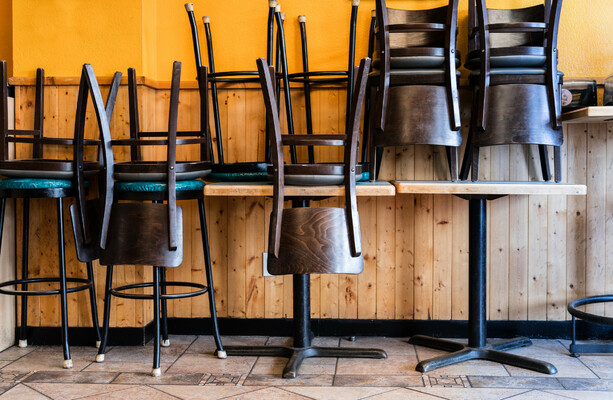Updated 4 hours ago
Pandemic Unemployment Payments (PUP) will reopen tomorrow for people laid off as a result of the latest Covid-19 restrictions introduced by the government.
Payment will have five different rates when it reopens to new arrivals. The highest price of €350 is available to those who earn €400 or more per week.
Those who earn between €300 and €399 will receive €300.
Those who earned €200 – €299 before being laid off will get €250 and €203 for those in the €151.50-€200 denomination.
Those who previously earned less than 151.50 euros will be paid a new rate of 150 euros.
Reopening Pay aims to support workers who have lost their jobs as a direct result of the introduction of the new restrictions, which take effect tomorrow.
Social Protection Secretary Heather Humphreys announced payment details today.
“This was not where any of us wanted to be, however, reopening the PUP for those directly affected will provide vital support during these challenging times,” Secretary Humphreys said.
« I want to assure everyone working in one of the affected sectors that should they lose their jobs, my management will be there to support them. »
The minister added that the fastest and easiest way to apply for a PUP is online via luxury website.
The Social Protection Department will use revenue data to check the employment status of all applications.
Hospitality
Representatives from the events and hospitality industries met with Tanist Leo Varadkar and Culture Minister Catherine Martin today.
Government Advertise a number of the new Covid-19 restrictions that will be in effect from tomorrow until January 9. They include a 50% reduction in capacity at indoor cultural, recreational, community and sporting events.
The current midnight curfew will also remain in place for hospitality with further social distancing measures and a limit of six people per table.
Taoiseach Micheál Martin said he would like to see theaters and concert venues open, despite the new restrictions.
« We don’t want people to take a financial hit in terms of organizing concerts and events, » Martin said.
« We want theaters to remain open, we want artists to keep performing, and I think the nature of the targeted support should be such that we can enable concerts like this to happen and also be viable for the participants. »
Tanist and the Minister of Culture co-chaired a Hospitality Forum meeting today to discuss the impact of recent government decisions.
Culture Secretary Catherine Martin acknowledged the pressure the industry is under, speaking alongside Taoiseach Martin and Tanaiste at Dublin Castle.
“I fully understand that it is not financially feasible to have their energy at 50%, but this is general health advice.
“So my focus is now on getting support in place, a scheme that means they can keep their doors open even at low capacity. I hope to be in a position to announce something in the coming days.
Also attending this meeting was Elaine O’Connor, co-founder of the Events Industry Association of Ireland.
She told RTÉ radio station Morning Ireland that the juvenile sector was currently going through a « worst case scenario ».
“We are at an all-time low now, and while we are grateful to have been added on this occasion to this meeting, we need more,” O’Connor said.
It called for focused events industry-specific meetings, more targeted support and cross-departmental team work at events.
O’Connor said the industry has made it clear that « 70% of capacity is not feasible for us. »
“To run a party at 50% capacity, you basically had to make 50% profit up front,” she said, adding that 70% of capacity was also a “struggle” to comply with.
No news is bad news
magazine support
is yours contributions You’ll help us keep delivering the stories that matter to you
Support us now
Case numbers
New numbers show that the number of Covid-19 cases jumped by 10% in the last two weeks of November.
The Central Statistics Office (CSO) published figures showing that there were 30,243 cases reported in Ireland in the week ending November 26, an increase of 10% from 27,536 cases in the previous week.
The research also showed that cases among those aged 14 or younger increased by 21% over the previous week and accounted for 27% of all cases in the week.
Nearly a third of cases were in people aged 25-44, while one in 20 was in those aged 65 and over, with cases in the 80s or over group down 11% from the week. the previous.
The latest numbers also show that there were 249 people hospitalized with confirmed Covid-19 in the week ending November 19, and 190 in the week ending November 26.
14 of them were admitted to the intensive care unit in the week ending November 19 and six in the week ending November 26.
People aged 65 or over represent half of all people hospitalized for the entire period of the pandemic so far, from March 2020 to the end of last month.
Abroad
Looking outside Ireland at the Covid-19 news today, Italy has introduced new rules for unvaccinated people.
People who have not been vaccinated against Covid-19 are being excluded from restaurants, theaters and indoor museums in an effort to limit the spread of the disease and encourage vaccinations.
From today until January 15, Italian police can check whether diners in restaurants or bars have a « super » green health card proving they have either been vaccinated or have recently recovered from the virus.
The number of new Covid-19 infections in Italy has been on a gradual rise over the past six weeks, even before concerns emerged about the new variant of Omicron.
Additional reporting by Simon Burke and the Press Association



:quality(70)/cloudfront-eu-central-1.images.arcpublishing.com/irishtimes/JWUFXT6XEJNKHEQOTLBQE6XG3U.jpg)

:quality(70)/cloudfront-eu-central-1.images.arcpublishing.com/irishtimes/LMA2PTBA7JJEAWS6264HMSESLM.jpg)







